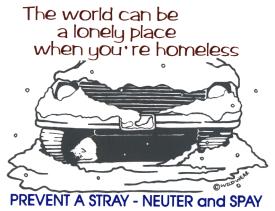Doggie Health and Safety Tips
Please note...
The guidelines and suggestions presented on this page are by no means medical opinion or veterinary advice and should not be regarded as such. Always consult your veterinarian for professional medical advice. This page is intended as an educational resource based on personal experience and research only. Please contact your vet IMMEDIATELY in any emergency situation or for any serious condition or injury.
|
|
There are a few basic rules about caring for your dog that we find most important to the well being of our dogs. These are:
- Love your dog- a dog is part of the family in our house. Dogs are pack animals by nature and need companionship and interaction with others of both the canine and human races. Linus and Lucy get plenty of hugs, words of encouragement and praise and lots of playtime with us both at home and away from the home. They also have social outgoings to the dog park and to family gatherings to socialize them with other dogs and people. This provides them with exercise, social interaction and experience with the world outside our home. It is always important to protect and watch them with dogs and people they are new to.-Protect your dog- Train your dog to come and stay reliably to avoid accidents that could cost your dog their life. Always have an I.D. tag on your dog for emergencies, you never know what could happen when your dog is without you or even with you. Linus and Lucy wear I.D. tags with their contact information and are also licensed. Dog licenses are usually very inexpensive and keep your dog legal as well as protected from euthanasia should they be picked up and end up in the pound. If you love your dog, let everyone know where they belong and that they are very important to you, should they be found. Microchipping your dog is a new way to identify your dog that is also effective. Ask your vet about this procedure. Be very careful about collars. Many accidents both harmful and fatal have happened while dogs are home alone or unsupervised. Collars can get caught or snagged on many objects in and outside the home. Keep the collar OFF when your dog is not on the leash or when they are under your supervision. (See article on next page entitled: What's Around Your Dog's Neck? ) While some trainers believe in choke collars and training collars (the ones with the prongs that dig into the dog's neck when jerked or pulled) they are NOT meant to be kept on when the dog is NOT training. If you MUST use this method of training (and I thoroughly discourage it) do NOT leave these collars on for any reason other than training, also be advised, these collars are meant primarily for large, difficult to control dogs, and can do damage to small dogs such as pugs, boston terriers and bulldogs who are most susceptible to respiratory problems. These types of collars have been known to cause tracheal collapse and spinal damage especially in these types of breeds. If your trainer advises this method of behavior modification, please do your research and question their outdated methods before going ahead with them. Training that does not involve physical harm or negative reinforcement is more productive and positive a way of training as well as a boost to your dog's self-esteem. Training should be pleasurable and build confidence for your dog, not cause submission and fear.
"Whether it is choke collars, shock collars or worse, physical punishment of dogs under the guise of "training a dog for her own good" is inappropriate and unnecessary. A trainer who believes the momentary strangling of a dog to teach her not to pull on her leash is necessary is hardly a friend of dogs-and certainly not worth the fee." --Choke and Shock Collars:Obedience Training or Physical Punishment?
Good Dog, Bad Trainer! -Keep your dog healthy- Don't make drastic changes in your dogs diet and make treats a special treat, not a regular thing. Be careful what you feed your dog, many human foods are unhealthy or hazardous to a dog's health. Bones can splinter and foods high in fat or sugar are as bad for your dog as they are for us. Feed your dog a regular diet designed for dogs that provides all the essential nutrients a dog needs. Excercise is important for a dog's physical AND mental well-being, make sure to keep a regular routine. Your relationship with your dog and the attention to his or her health and well being are so important. Make it a habit to praise your dog when they deserve it and give them every opportunity to receive praise and love. Your guidance, encouragement and praise mean as much to their self-esteem and confidence as it does to a child. If you love your dog, (and if you have one in your family-you should!) then love, protect and keep them healthy and above all...Happy!!!
|
 |
Important Phone Numbers
In case of emergencies, always keep your family veterinarian's phone number on hand as well as the local emergency clinic. Also keep these numbers on hand for emergencies:
National Animal Poison Control
1 (900) 680-0000
a charge per case is charged directly to your phone number regardless of the length of the call
OR call
1 (888) 426-4435
to have the fee charged to your credit card. Both hotlines are open 24-hours a day seven days a week.
National Pet Emergency Hotline
This hotline is staffed by trained professionals who can put you in contact with a local pet clinic for emergency pet care or a lost pet.
1 (888) PETS-911 (1-888-738-7911)
|
 |
Doggie First Aid Kit 
Keeping a first-aid kit on hand for your dog. The following is a list of important items that should be part of a doggie first aid kit:- Emergency phone numbers
- Cold packs
- Nonstick sterile gauze pads
- Adhesive bandaging tape that won't stick to wounds
- Cotton balls and cotton swabs
- Antiseptic or antiseptic wipes
- Tweezers
- Antibiotic First-Aid ointment
- Benadryl for stings or bites
- Thermometer
- Eye drops
- Cleansing ear drops
- Rescue cream
- Sharp pointed scissors
Also check out: www.dog-first-aid.com
|
|
Herbal Health Remedies
There are times when herbal remedies are preferred and the following section is a short list of alternative treatments to common ailments. For more information see the contact information listed or ask your family veterinarian.
(from 50 Simple Ways to Pamper Your Dog by Arden Moore)
Always check with a holistic veterinarian or the American Herbalists Guild at (435) 722-8434 or at www.healthy.net before giving your dog herbal medicine. Find a holistic vet at: American Holistic Veterinary Medical Association
Allergies: chamomile, nettles, ox-eye daisy
Anxiety: passionflower, Rescue Remedy (a brand-name specialty flower essence mixture)
Arthritis: Alfalfa, dandelion, devil's claw, parsley, yucca
Bleeding: cayenne, shepherd's purse
Burns and cuts (minor): aloe, calendula, St. John's wort
Constipation: plantain, senna, tumeric
Diarrhea: marsh mallow, slippery elm
Fleas: chaparral, sage, wormwood
Gas: chamomile, dill, fennel, peppermint
Hyperactivity: skullcap with chamomile or valerian
Indigestion: dill, hawthorn, marsh mallow, plantain, slippery elm
Infections (bacterial or viral): cat's claw, echinacea, garlic
Motion sickness: ginger
Nervousness: hops, valerian
Skin problems: burdock, ginger, sage
Urinary infections: echinacea, marsh mallow, yarrow
For more information on Herbal Health and Aromatherapy check out:
"Holistic Aromatherapy For Animals" by Kristen Leigh Belland "The Healthy Dog Book" by Alexandra Bastedo and Jeannie Kemnitzer
|
|
Top 10 Reasons to Spay or Neuter Your Dog
1. Altered dogs, on average, live longer, healthier lives
2.Female dogs spayed before their first birthday are 99.9% less likely to develop reproductive cancer
3. Altered dogs behave better and are more focused on training
4. You'll stop overpopulation. One female dog and her offspring can produce 67,000 dogs in just six years
5. You'll stop homelessness. Only one in four dogs finds a permenant, loving home
6. You'll stop the killings. More than eight million surplus dogs and cats are destroyed each year because there are not enough homes for them. Taxpayers pick up the tab to the tune of million
7. Eighty percent of dogs struck by vehicles are unaltered males
8. The majority of dog bites to postal carriers are from unaltered male dogs
9. Pet licensing fees are lower in cost for altered dogs in many cities and counties
10. Thanks to improved surgical and anesthesia equipment and techniques, you can spay a female or neuter a male as early as 8 weeks of age. Don't hesitate!
-From: Top 10 Reasons to Spay or Neuter Your Dog from 50 Simple Ways to Pamper Your Dog by Arden Moore
|
|
Pet Insurance
Pet Insurance can be very helpful for accidents and emergencies. For routine care, pet insurance doen't cover much if anything at all, but it's those unforseen situations that cost us the most. Linus ingested a large piece of plastic that was lodged in his belly and that he needed emergency surgery for "foreign body removal". The surgery cost us . With the insurance that we have now, it would have covered all but our deductible! Check out these pet insurance companies. Linus and Lucy's is listed first. We chose them because they offer more coverage and unlimited incidents, no maximum annual benefit and with the plan we have, they cover 100% of the cost after our deductible.
Personal note: VPI pet insurance was previously listed on our site but has been taken off because of recent information that has come to light about the CEO of the company. Whilst this man is running a company that we as caring guardians and animal lovers put our money towards for the lives and health of our animals, he does not extend this to animals within range of his hunting rifle. Someone who, as a veterinarian has enough knowledge to know how animals suffer and is in the business of helping animals in pain ironically puts a host of other animals to death for sport. (for more info click here: VPI CEO takes lives instead of insuring and protecting them...)
Read My letter to VPI's CEO
Below are some insurance companies we will support.PetCare Pet Insurance(http://www.petcareinsurance.com) Healthy Pet Insurance (http://www.healthypetinsurance.com) PetsHealth (http://www.petshealthplan.com) ShelterCare (http://www.sheltercare.com)
|
|
|
|